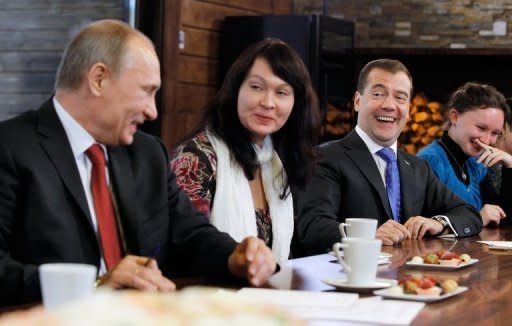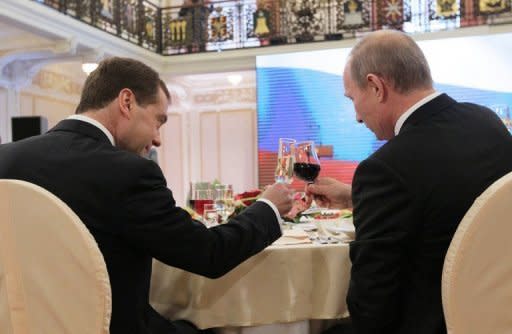Russia sets presidential poll for March 4
The upper house of Russia's parliament on Friday formally set March 4 as the date for the presidential election, a vote expected to see Vladimir Putin return to the top job. "The elections for the president of Russia are set for March 4, 2012," the Federation Council said in a statement on its website after senators approved the date in a vote called for under the constitution. Putin, the current prime minister, is expected to reclaim the presidency in the poll, making a dramatic comeback to the Kremlin after his protege President Dmitry Medvedev agreed to a job swap. The election date will be published in state newspaper Rossiiskaya Gazeta in a late Friday edition, the editor Andrei Fedotkin was quoted by RIA Novosti news agency as saying, formally launching the campaign process. Once the date is published, parties will be able to formally put forward their candidates. They will have until 18 January to submit their documents to the Central Electoral Commission, United Russia said in a statement on its website. Putin announced in September at a glitzy ruling party congress that he planned to stand for a third presidential term, while Medvedev said he was ready to serve as his prime minister in a surprise job swap. Former KGB agent Putin hand-picked Medvedev to succeed him in 2008 after spending eight years in the Kremlin, but Medvedev's approval ratings have remained somewhat lower than his mentor's. Putin first became president when Boris Yeltsin dramatically resigned on New Year's Eve 1999. He restored Russia's stability during a period of high oil prices but was also accused of imposing an authoritarian regime. After Putin left the Kremlin in 2008 to become prime minister, almost all observers assumed he retained the real power in Russia even as Medvedev embarked on a drive to modernise the country. The ruling United Russia party is holding a conference with around 11,000 members in a Moscow sports stadium on Sunday, which is set to back the nomination of Putin. Under constitutional changes pushed through by Medvedev and which many long suspected were aimed at further strengthening Putin, the new president will have a six-year mandate rather than four years as before. This means that if the 59-year-old Putin again served the maximum of two consecutive terms, he could stay in power until 2024, by which time he would be 72 and the longest-serving Moscow leader since dictator Josef Stalin. Two opposition parties, the Communist Party of Russia and the nationalist Liberal Democratic Party of Russia, have announced their long-term leaders Gennady Zyuganov and Vladimir Zhirinovsky will stand as candidates. An opinion poll by the independent Levada centre published Friday found that 31 percent would back Putin in a presidential race, with Zyuganov and Zhirinovsky trailing with eight and six percent, respectively. The March vote will follow parliamentary polls on December 4, which are seen as a dress rehearsal for the presidential election and which United Russia is expected to win. United Russia secured a landslide majority of 64.3 percent in the last parliamentary election in 2007. But it has recently seen a decline in its ratings. The latest Levada poll found that only 53 percent intended to vote for United Russia. Putin on Thursday urged the party to get good results in the polls, so as not to lose its majority and end up with a fractious parliament like in some crisis-ridden euro zone states. "I'd like to draw your attention to the need to achieve the maximum results at these elections, because if we break up the parliament, we will be like in certain countries, not able to take the necessary decisions at the necessary time," he warned.



